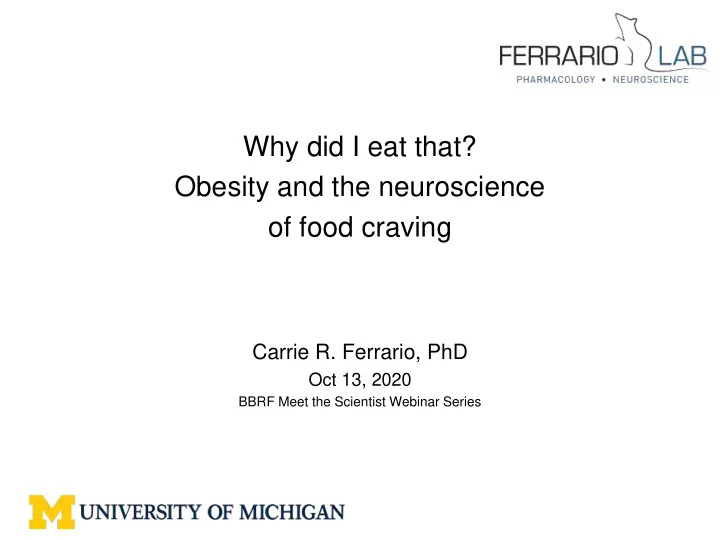

Why did I eat that? Obesity and the neuroscience of food craving Carrie R. Ferrario, PhD Oct 13, 2020 BBRF Meet the Scientist Webinar Series
Most often used food word Most often used “activity” word Peter Sheridan Dodds, University of Vermont http://compstorylab.org/share/papers/alajajian2014a/maps.html
Brain Systems Mediating Cue-Triggered Motivation Rat brain Human brain Glutamate = excites Dopamine = modulates Adapted from Ferrario et al., J.NS, 2016 Adapted from Feder et al., 2008
Outline: Cue-triggered motivation is stronger in obesity susceptible rats before obesity. • Food-seeking • Approach Effects of sugary, fatty “junk - foods”
Rodent models: Selectively bred rat model Number of Subjects Body Weight
Rodent models: Selectively bred rat model Number of Subjects Body Weight Is cue-triggered food-seeking enhanced in obesity-prone rats? (Levin et al., 1997)
Lever Press for Food (Food-Seeking) 30 OP OR Avg # Lever Presses 20 (Rs/min) 10 0 Active Inactive lever lever Derman & Ferrario, Neuropharm., 2018
Learn Food/Cue Relationship Control Cue Food Cue Obesity-Prone Obesity-Resistant Food cue Avg # Food Cup Entries Food cue (Rs/min: CS-ITI) Control cue Control cue Training Day Derman & Ferrario, Neuropharm., 2018
Test: Does the food cue enhance food-seeking? CS- CS+ Control Cue Food Cue White Noise Tone No Food Given
CS- (Control Cue)
CS+ (Food Cue)
Greater cue-triggered food-seeking in obesity-prone rats Active Lever Responding 8 * Avg Active Lever Presses OP Active Lever Presses OR 6 (Rs/min: CS-ITI) (#/min) 4 2 0 -2 CS+ CS+ CS- CS- Derman & Ferrario, Neuropharm., 2018
Greater cue-triggered food-seeking in obesity-prone rats Active Lever Responding 8 * Avg Active Lever Presses OP Active Lever Presses OR 6 (Rs/min: CS-ITI) (#/min) 4 2 0 -2 CS+ CS+ CS- CS- Derman & Ferrario, Neuropharm., 2018
Cue-triggered Approach 60 Avg # Food Cup Entries 50 OP 40 OR 30 20 10 0 1 2 3 4 5 6 7 8 Training Day Session Unpublished data
Standard Rats: Training Cue-triggered food-seeking no food given Junk-Food Purina Lab Chow Junk-Food Mash Fat 4.5% 19.6% Protein 23% 14% Carbs 48.7% 58% Calories 4 kcal/g 4.5 kcal/g
Standard Rats: Cue-triggered food-seeking no food given Junk-Food 4 7 5 4 5 0 Weight (g) 4 2 5 4 0 0 3 7 5 3 5 0 3 2 5 3 0 0 Gainer Non-Gainer 0 1 2 3 4 5 Week on JF
Cue-triggered Food-Seeking Cue-triggered Approach JF-Gainers Active Lever Presses Avg # Responses (#/min) JF-Non-Gainers r = 0.56 P < 0.01 Weight after Junk-Food Derman and Ferrario, Beh Brain Res 2020 Robinson et al.,NPP 2015
Take-homes 1: 1) Vulnerability factor in humans 2) Provides a useful tool
Green=DRD1-CRE+ cells, rat MSN image by Grazyna Gorney, Kolb lab
Glutamate Synapse “Typical” AMPA Receptors Majority of AMPARs Allow Na + into cell (excitation) “A - typical” CP -AMPA Receptors Very few in adult brain (~10%) Selectively blocked by NASPM Allow Ca 2+ into cell (stronger excitation) Do CP-AMPARs mediate cue-triggered food-seeking?
Training Lever Press Food Cue for Food Training CP-AMPAR Blockade During Test Intra NAc infusion of: • Control • NASPM (blocks CP-AMPARs) No Food Given Derman & Ferrario, Neuropharm., 2018
Obesity Prone Active Lever Presses (#/min) CP-AMPAR Control Block Activity of CP-AMPARs is needed for cue-triggered food-seeking. Derman & Ferrario, Neuropharm., 2018
Does eating junk-foods enhance AMPARs? Do effects differ in obesity-prone & obesity-resistant rats?
Standard Rats: Chow (3 weeks) JF-Deprivation 3 months Junk-food increases CP-AMPAR function Oginsky et al., NPP, 2016
Selectively bred obesity-prone and obesity-resistant rats 10 days Chow (2 weeks) JF-Deprivation Chow
Junk-food increases CP-AMAPRs in obesity-prone but not obesity-resistant rats
Oginsky et al., NPP, 2016
Take-homes 2: 1) Changes in bran function occur in response to eating junk-food 2) Obesity-prone more sensitive to these effects
Why different behavioral sensitivity & neural changes?
Inherent enhancements in Medium Spiny Neuron function MSN image by Grazyna Gorney
Males Females MSNs fire more easily MSNs fire more easily # of Action Potentials 20 15 OP OP # of Action Potentials * * OR 15 OR *** 10 * 10 5 Obesity-Resistant 5 0 M/D -5 0 0 50 100 150 200 100 200 300 400 Injected current (pA) Injected current (pA) Obesity-Prone Oginsky et al., Psychopharm , 2016 Oginsky et al., J. Physiol, 2019 Alonso-Caraballo & Ferrario, Horm & Beh, 2019
Outbred SD Rats M/D * * * * * * * # of Action Potentials OP OR * OR OP Female F1 Female F1 OP OR
Why different behavioral sensitivity & neural changes? Fire more easily, easier to induce changes in cell function.
Does junk-food enhance cue-triggered motivation? Training Lab Chow Junk-Food Food-cue Chow (14 days) JF-Deprivation 30 days Control Approach to cue alone?
8 Mean Food Cup Entries Avg # Food Cup Entries 6 (CS-ITI: Rs/min) (#/min) 4 2 0 Con Food Con Food -2 Cue Cue Chow Junk-Food
Junk-food enhances cue-triggered approach 8 Mean Food Cup Entries Avg # Food Cup Entries 6 (CS-ITI: Rs/min) (#/min) 4 Outstanding Questions: Effects greater in OP vs OR? How long lasting? 2 Mechanisms? 0 Con Food Con Food -2 Cue Cue Chow Junk-Food
Current Lab Members: Past Lab Members: Tracy Fetterly, PhD # Yanaira Alonso-Caraballo, PhD @ Julie Finnell, PhD Rebecca Derman, PhD + Peter Vollbrecht, PhD # Megan Wickens, PhD Max Oginsky, PhD #,* Amanda France Jacob Ormes Emma Bergman Allison Nieto Cameron Nobile Anish Saraswat Sophia Dunlap Rachel Springsdorf $ Ongoing Collaborations: Travis Brown (U WY) Monica Dus (UM) Terry Robinson (UM) Trainee Funding: +F31DK111194, @F99NS108549, Research Funding: R01-DK106188; R01-DK115526; R01- DA044204; R21-DA045277; Brain & Behavior Foundation *F32DK112627A, #T32DA007268,$T32DA007281
Take-homes: 1) Junk-food changes in brain function before obesity 2) Obesity-prone more sensitive to junk-food & cues 3) Vulnerability factor 4) Rodent models are useful tools
Cue-triggered motivation is greater in obesity-prone females & varies with the cycle in obesity-prone, but not obesity-resistant rats. Cue-triggered Approach Work for Food Avg # Food Cup Entries (Resp/min; CS-ITI) Food Intake MD= Metestrus/Diestrus PE= Proestrus/Estrus Alonso-Caraballo & Ferrario, Hormones & Behavior, 2019; BioRxiv; 669804
Recommend
More recommend